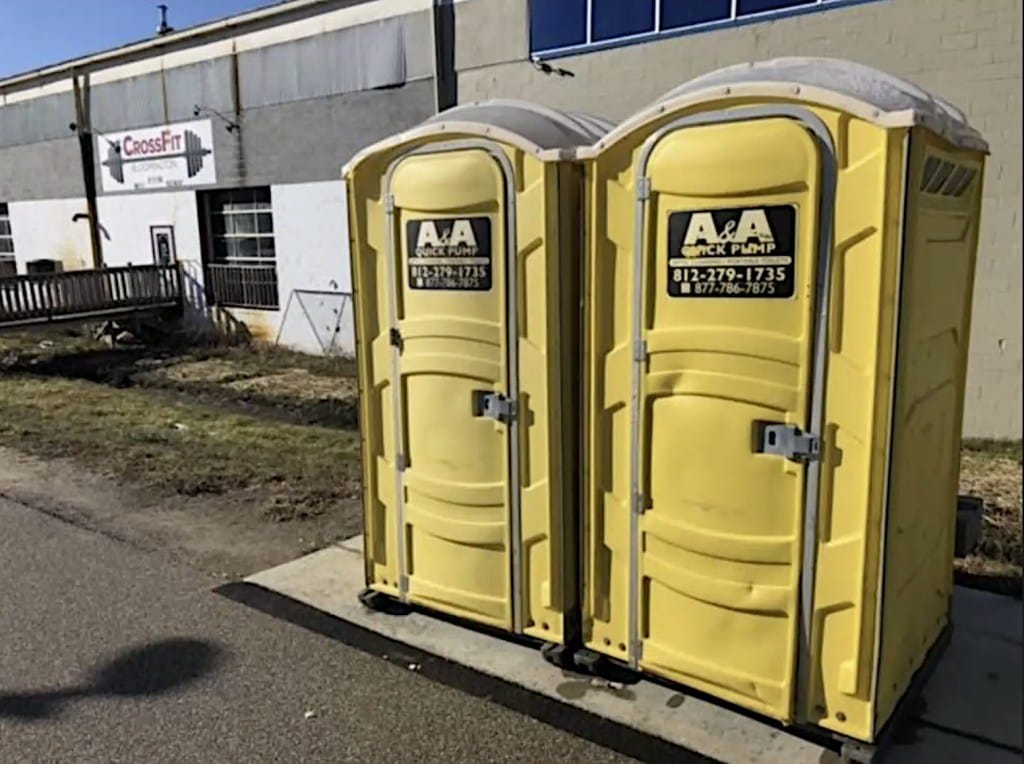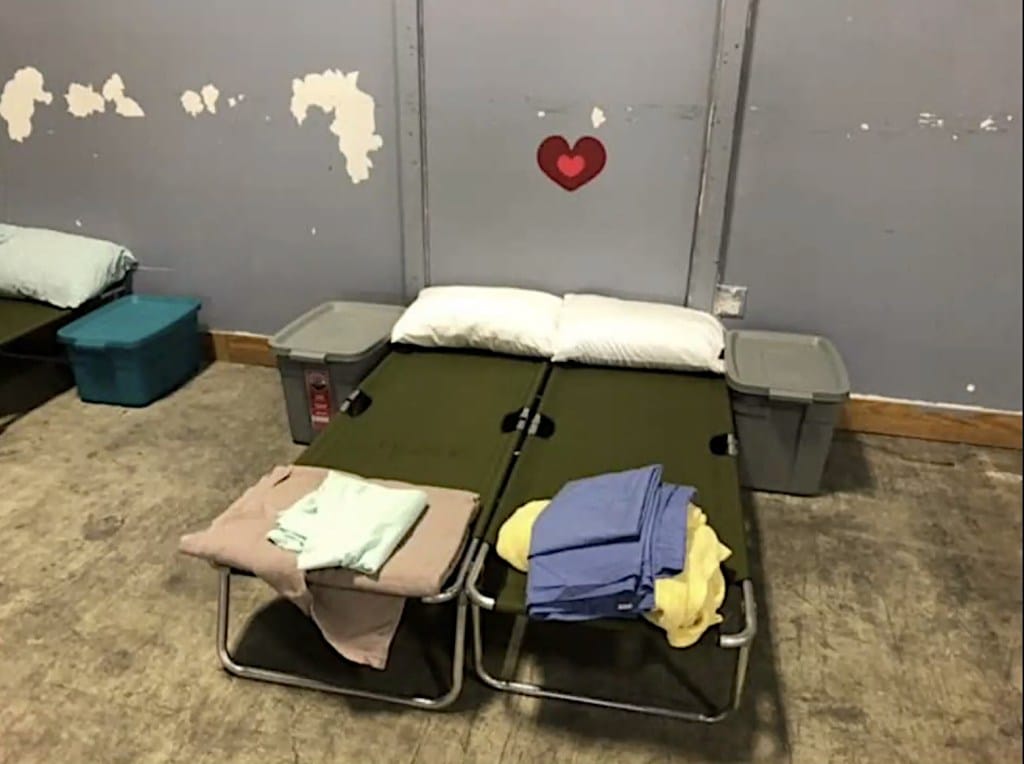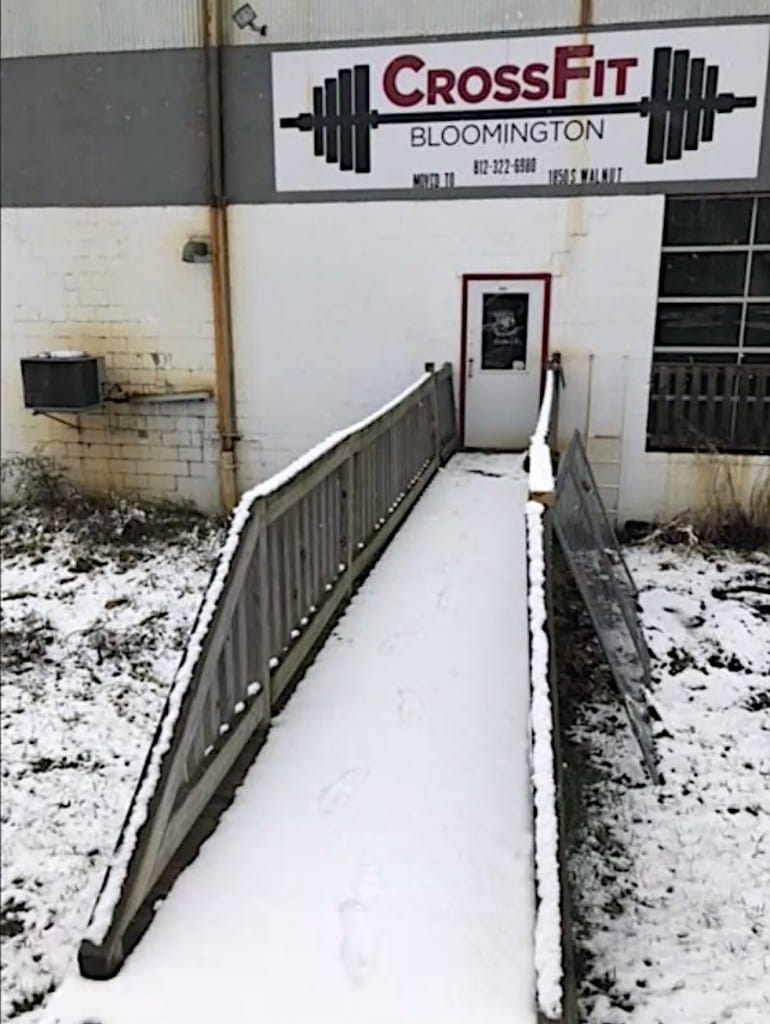New Bloomington shelter already half full on first night: 26 total guests, not counting 3 pets






On Tuesday, Beacon, Inc. opened a new, 49-bed temporary winter shelter for the houseless, in the warehouse space across the B-Line Trail from Switchyard Park’s pickleball courts.
At Wednesday morning’s regular meeting of Monroe County commissioners, Beacon, Inc.’s executive director Forrest Gilmore updated the three county officials on the tally for the first night of operation.
A total of 26 people slept there, Gilmore told commissioners. That included seven couples. Three dogs were also a part of the mix. Three more people stopped by to get warmed up, but did not stay the night.
The only women who stayed at the shelter that night arrived as part of a couple. That’s something that Gilmore said should be recognized and noted, because a lack of couples beds could pose a barrier to women seeking shelter.
The first night’s occupancy was more than Gilmore expected and he thinks it will increase when word spreads that it’s a safe place.
The new shelter was set up with an eye towards removing as many barriers as possible, based on a survey of people who were at the time living in Seminary Park, Gilmore said.
How many beds are available in local shelters and whether residents of the Seminary Park encampment have viable alternatives, based on the number available beds, has been a point of friction in recent weeks.
Even though the new shelter is now open, that will not eliminate encampments, according to Nicole Johnson, who’s director of Pigeon Hill Pantry.
During public commentary time, Johnson told commissioners: “We’re going to see an awful lot of people in tents in the coming months.” That’s because there are a few thousand people living in Monroe County who have been able to stay in their rented spaces, only due to pandemic-related moratoriums on evictions due to nonpayment of rent, Johnson said.
On Wednesday afternoon, three tents were still set up on the Walnut Street edge of the park, and a couple more stood in the interior of the park.
Gilmore was reporting the first night’s totals to the county commissioners, because they had on their agenda two items that provided funding support to Beacon, Inc.’s sheltering efforts. One was approval of a grant for $22,000 to maintain weekend services at Beacon, Inc.’s day shelter.
The other agenda item was the approval of $20,000 to help fund the new temporary shelter in the warehouse across from Switchyard Park, which is supposed to operate through April 15. Gilmore told The Square Beacon that support for the new shelter also came from Bloomington Township, Perry Township, and the United Way.
The warehouse building where the new temporary shelter is located is currently the subject of a rezone request so that it can be redeveloped.
On the question of available beds, the city of Bloomington has tended more towards the view that there are adequate resources at shelters for those who’ve been staying at Seminary Park. So the city cleared the Seminary Party encampment in early December and again last week.
Grassroots organizations and Beacon, Inc. have pointed out that an open shelter bed might not be available to everyone.
The first night’s tally of guests reflected some success in eliminating the kind of barriers that Beacon, Inc.’s street outreach had identified through interviews of 39 people who were at the time sleeping in Seminary Park.
Some of the houseless people who were interviewed said they didn’t want to go to a shelter because they have a partner and don’t want to go to a shelter where they have to be separated. The new shelter has couples beds, which meant seven couples could stay at the shelter on its first night.
Others who were interviewed had animal companions that they did not want to leave behind. The three guests who showed up with dogs on Tuesday night were not turned away.
Other identified barriers included perceptions of discrimination by shelters for reasons of religious faith or sexual orientation.
During public commentary, Johnson told commissioners that another barrier that might prevent a park camper from seeking shelter is the challenge of storing their possessions. “A lot of the individuals that won’t leave their tents, it’s because they have to leave their belongings,” she said.
Johnson described how anytime a camper wants to leave the area of their tent, even for a short while, they have to arrange a “tent sitter” to make sure their belongings aren’t stolen. That means the idea of leaving their tent to stay at a shelter, is a barrier, Johnson said.
During public commentary at Wednesday’s meeting, county commissioners were called out for their role in the arrest of some tent campers on county land off South Rogers Street. In an email to The Square Beacon, Monroe County’s sheriff, Brad Swain wrote, “Commissioners asked for [patrol] of the property to ensure trespassing and camping was not happening.” One arrest was made based on an active warrant. The other man was arrested for drug possession lying about his identity.
At Wednesday’s meeting, president of the board of commissioners Julie Thomas said, “We were really specific in our request with Sheriff Swain, to leave the campers where they were on county property.”
Thomas added that it came at a time when commissioners did not believe shelter space was available. “We’re not going to say: Well, we’re going to remove campers and guess what, there’s no shelter space!” Now that Beacon, Inc.’s new shelter is open, Thomas said, “It looks like now there’s shelter space.”
Thomas added, “The sheriff has been very receptive to understanding the locations where folks can be taken for safety.”
The specific property in question, which is about 87 acres north of Cherokee Drive, off Rogers Street, is also problematic, Thomas said. “We have real concerns about the property in question because there are small little quarry pits all over the place and no lighting,” Thomas said. She added, “It’s not a safe place.”
Thomas wrapped up her remarks on the topic by saying, “We are not interested in hosting a year-round camp site, when it is against our health order and our health code.”




Comments ()